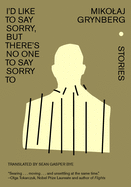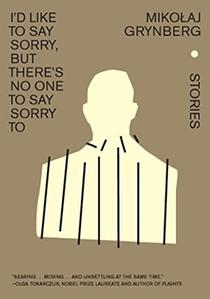
 Photographer/psychologist/author Mikołaj Grynberg is best known in his native Poland for his documentary nonfiction featuring his generation of Polish Jews, born after the Holocaust and raised by survivors. Grynberg turns to fiction for the first time with I'd Like to Say Sorry, but There's No One to Say Sorry To, a sparse but dense collection of 31 precisely distilled short stories in which he "seeks to tell these personal stories in literary form." The result--wrenching, astonishing, surprisingly humorous--is a stupendous success: gorgeously crafted, deeply affecting narratives, empathically translated by Sean Gasper Bye, who also appends an illuminatingly personal endnote.
Photographer/psychologist/author Mikołaj Grynberg is best known in his native Poland for his documentary nonfiction featuring his generation of Polish Jews, born after the Holocaust and raised by survivors. Grynberg turns to fiction for the first time with I'd Like to Say Sorry, but There's No One to Say Sorry To, a sparse but dense collection of 31 precisely distilled short stories in which he "seeks to tell these personal stories in literary form." The result--wrenching, astonishing, surprisingly humorous--is a stupendous success: gorgeously crafted, deeply affecting narratives, empathically translated by Sean Gasper Bye, who also appends an illuminatingly personal endnote.
Most of Gynberg's stories are presented interview-style, their narrators sharing memories, experiences and often secrets. Revealing Jewish identities is one of Grynberg's most penetrating themes: "It wasn't a message she passed on to us, it was fear," a granddaughter says in reaction to her late Grandma's deathbed revelations of "ghettos... Auschwitzes... gas" in the opening "Unnecessary Trouble." In "An Elegant Purse," a mother fuels a contentious relationship with her daughter for decades in order to protect her child from her Jewish history. An estranged father confesses to multiple generations of suicide in twisted attempts to expunge the family's Jewish roots in "Bitter Chocolate." A boy with a limp learns of his Jewish parentage after his mother's death in "An Empty Jewish Soul." In "Klementyna," a 90-year-old has never shared her Jewish history with her two daughters "who don't know they're Jewish... [with] clear consciences now." A teen making his annual visit to his Polish grandmother learns of his heritage when she sends him to a Jewish summer camp in "Birthright."
Additional standouts showcase especially piercing sentences: all the reasons "it's better not to be a Jew" in "Cacophony"; "I give you murder in the camps, you give me Jewish suicide," referencing a Polish man's visit to Israel in "A Jewish Barter"; "We have jokes because we haven't got any hope. But we sure know how to laugh," in "A Joke for You." Dark humor enlightens an American man's Fiddler on the Roof-infused search for his Polish roots in "Anatevka." The poignant English title derives from the final line in the apologetically anti-Semitic "My Five Jews."
In this collection--originally called Rejwach--hullabaloo, uproar--Grynberg efficiently renders desperate choices, unspeakable endurance and unexpected laughter into compact literary mementos. While oral history inspires and informs Grynberg's fiction, translator Bye reminds readers of the currently "mounting official anti-Semitism in Poland, when many... see no place in Poland for Jews." Grynberg's significant collection stands stalwart as a "testimony of a Jewish present--a Jewish presence." --Terry Hong, Smithsonian BookDragon
Shelf Talker: Polish photographer/psychologist Mikołaj Grynberg alchemizes his documentary nonfiction into a superb collection of 31 short stories poignantly revealing the Polish Jewish experience.

